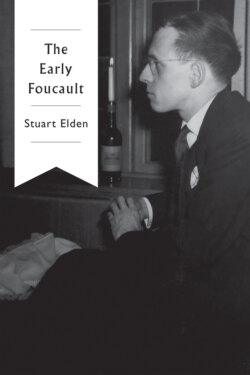Читать книгу The Early Foucault - Stuart Elden - Страница 10
Structure of this Study
ОглавлениеFoucault usually referred to History of Madness as his first book. It is where he begins his candidacy presentation for his chair at the Collège de France, written in 1969, for example (DE#71 I, 842–3; EW I, 5–6). Foucault goes on to situate Birth of the Clinic, The Order of Things and The Archaeology of Knowledge within an overall narrative, and then outlines how his research would develop if he were to be elected to the position. That chronology is well established in the literature, though newly available and forthcoming materials add to it, and the literary is a crucial parallel theme. This period will be discussed in The Archaeology of Foucault. But how Foucault arrived at its putative beginning is a far from straightforward story. While many studies of Foucault begin with the first major book, History of Madness, in 1961, that is where this book ends.
This book therefore offers an account of the long process that led to that major work. Chapter 1 discusses Foucault’s university studies in Paris, in philosophy and psychology, and particularly analyses his diploma thesis on Hegel under the supervision of Jean Hyppolite. Chapter 2 looks at the beginning of Foucault’s own teaching career in Lille and Paris, using various archival sources, and discusses some unpublished manuscripts which may have developed from teaching materials. Chapter 3 discusses the texts he actually published in this period, which are a fraction of what he wrote. Newly available sources help to resolve long-standing issues about the dating of these texts. In Chapter 4, his work as a co-translator of Binswanger and von Weizsäcker is analysed, showing how Foucault and his colleagues rendered German into French.
All these early publications were completed before Foucault moved to Uppsala in 1955. That move is a break in his career, initiating a period of sustained research for the History of Madness alongside the engagement with new inspirations, notably the philosophers Friedrich Nietzsche and Martin Heidegger and the comparative mythologist and philologist Georges Dumézil. His engagement with Nietzsche and Heidegger is the subject of Chapter 5, along with the intellectual side of his relationship with the modernist composer Jean Barraqué. The research and writing he did in Uppsala and Warsaw on madness is the focus of Chapter 6, which also discusses his teaching and cultural activities. Chapter 7 examines the year he spent in Hamburg when he translated Immanuel Kant’s Anthropology. Chapter 8 looks at the defence, publication and abridgement of the History of Madness, and how Foucault was led by this work to revise his first book. The last pages explore how themes from this period point towards his concerns in the 1960s.
While this book, therefore, has its focus on how Foucault’s career led to the History of Madness, it shows a number of other paths explored but not ultimately taken. Among other themes, it shows Foucault’s detailed readings of Hegel, the phenomenologist Edmund Husserl and Kant, all of which led to substantial manuscripts, which he chose not to publish. Foucault’s engagement with the Daseinsanalysis movement, while long known, given the introduction to the Binswanger translation, goes much deeper and archival sources help to substantiate its importance. Foucault’s concern with the question of philosophical anthropology is also significant. The encounter with Nietzsche and Heidegger, while long known to be crucial, is here explored anew in the light of new or neglected sources. This book also analyses his profound yet critical interest in psychology – as a student, researcher and teacher. The importance of teachers, including Louis Althusser, Hyppolite, Maurice Merleau-Ponty and Jean Wahl, in his intellectual formation is explored, as is the influence on his later development by people who never taught him, including Georges Canguilhem and Dumézil. The book utilizes archival sources extensively to fill in details of his teaching, writing and plans for abandoned theses. In the years covered here, Foucault was institutionally located in Paris, Lille, Uppsala, Warsaw, Hamburg and Clermont-Ferrand. All of these settings are significant in the story, which has a geography as much as a history. In tracking and mapping it I have found myself retracing some of Foucault’s own steps.
